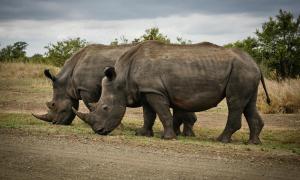Earthava Issues Urgent Report: Multiple Animal Species Facing Extinction Within Decades
DELAWARE, DE, UNITED STATES, November 10, 2025 /EINPresswire.com/ -- Earthava, an independent sustainability media platform, has released a comprehensive feature examining which animal species are closest to extinction and what this means for global biodiversity. The article, titled "Endangered Species Alert: What Animals Are About To Go Extinct?", offers a clear, data-driven look at the current state of endangered wildlife, drawing on sources from the IUCN Red List and recent ecological research.
The feature identifies species across every major animal group, mammals, birds, reptiles, amphibians, freshwater fish, and invertebrates, that are rapidly losing population numbers due to habitat loss, poaching, invasive species, and climate change. Amphibians and freshwater fish emerge as two of the most vulnerable groups, facing mounting threats from water pollution, temperature shifts, and disease outbreaks.
According to Earthava's report, extinction isn't limited to remote rainforests or isolated islands. Many species at risk play essential ecological roles, from pollination and water purification to carbon storage and food security. Their decline, the article notes, has direct consequences for human societies, particularly in regions that depend on natural ecosystems for livelihood and stability.
The piece emphasizes that while conservation progress has been made, funding gaps, fragmented policies, and a lack of community involvement continue to undermine results. Earthava underscores that reversing these trends will require coordinated action: stronger habitat protection, sustainable resource management, innovative monitoring tools, and public participation.
Highlights from the article include:
Amphibians and freshwater fish are disappearing faster than any other vertebrates, yet remain underrepresented in conservation discussions.
Several species could vanish by 2050 if current pressures persist.
Local engagement and policy alignment are key to achieving measurable recovery.
By shedding light on these often-overlooked species, Earthava hopes to inspire awareness and practical solutions, not despair. The goal, as the publication states, is to "turn data into empathy and empathy into action."
The feature identifies species across every major animal group, mammals, birds, reptiles, amphibians, freshwater fish, and invertebrates, that are rapidly losing population numbers due to habitat loss, poaching, invasive species, and climate change. Amphibians and freshwater fish emerge as two of the most vulnerable groups, facing mounting threats from water pollution, temperature shifts, and disease outbreaks.
According to Earthava's report, extinction isn't limited to remote rainforests or isolated islands. Many species at risk play essential ecological roles, from pollination and water purification to carbon storage and food security. Their decline, the article notes, has direct consequences for human societies, particularly in regions that depend on natural ecosystems for livelihood and stability.
The piece emphasizes that while conservation progress has been made, funding gaps, fragmented policies, and a lack of community involvement continue to undermine results. Earthava underscores that reversing these trends will require coordinated action: stronger habitat protection, sustainable resource management, innovative monitoring tools, and public participation.
Highlights from the article include:
Amphibians and freshwater fish are disappearing faster than any other vertebrates, yet remain underrepresented in conservation discussions.
Several species could vanish by 2050 if current pressures persist.
Local engagement and policy alignment are key to achieving measurable recovery.
By shedding light on these often-overlooked species, Earthava hopes to inspire awareness and practical solutions, not despair. The goal, as the publication states, is to "turn data into empathy and empathy into action."
Sam
Earthava
email us here
Visit us on social media:
LinkedIn
Instagram
Facebook
YouTube
TikTok
Legal Disclaimer:
EIN Presswire provides this news content "as is" without warranty of any kind. We do not accept any responsibility or liability for the accuracy, content, images, videos, licenses, completeness, legality, or reliability of the information contained in this article. If you have any complaints or copyright issues related to this article, kindly contact the author above.

